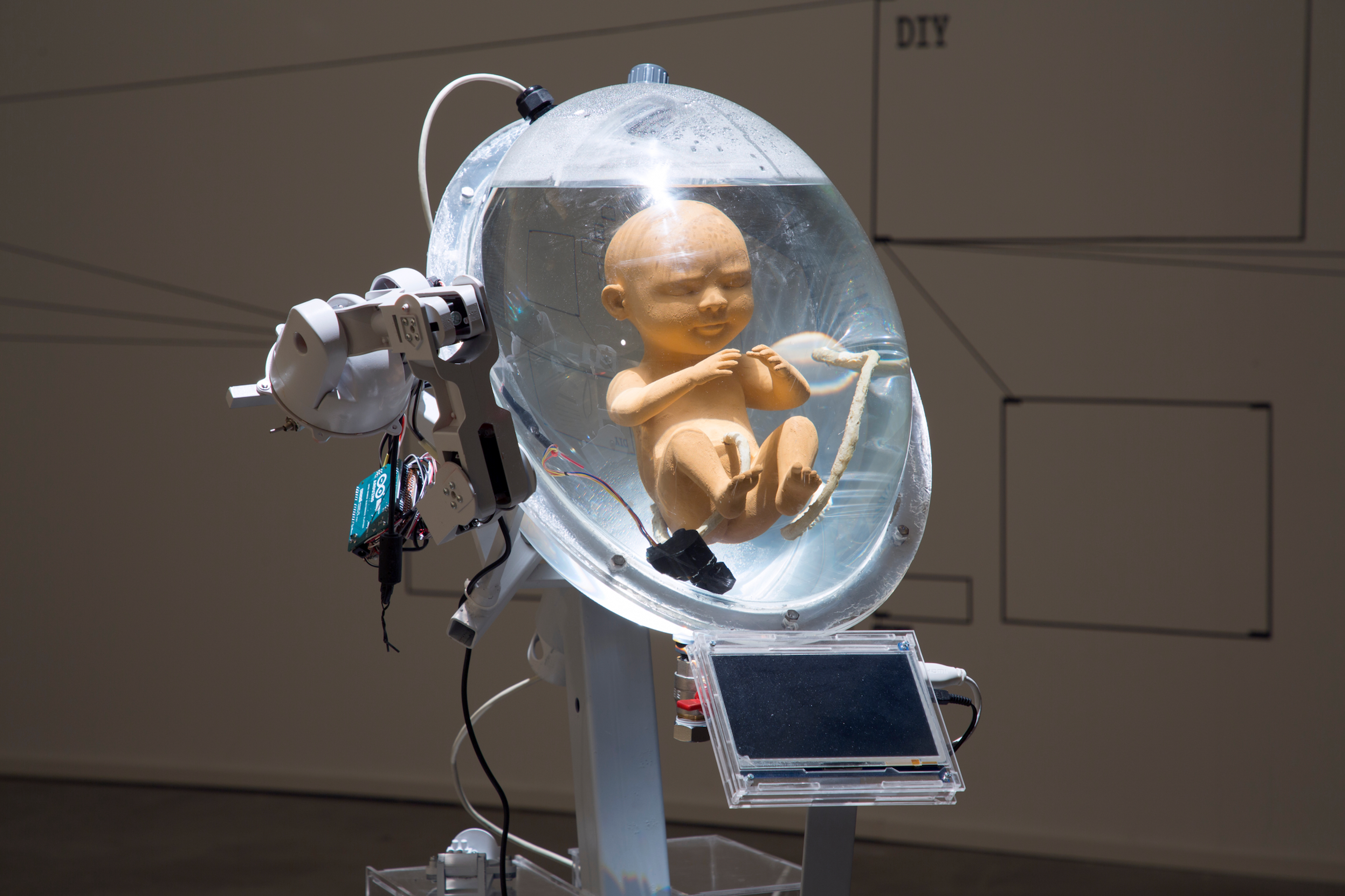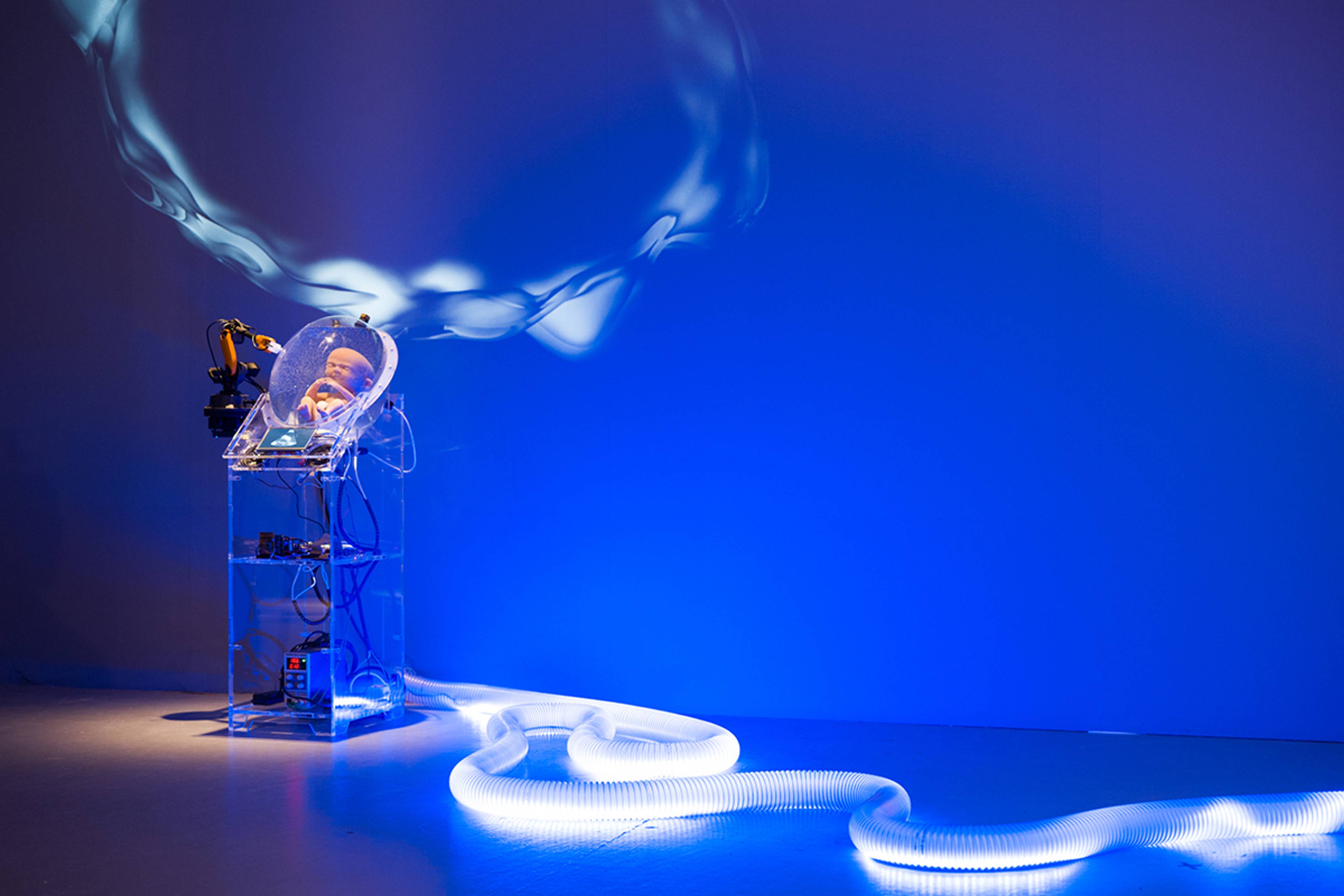Imagine if the voice of Siri was a man. Would you be more or less annoyed if he told you that you were driving the wrong way? Somehow, the consensus of the tech world is that artificial intelligence should be given the voice of a woman. More specifically, the voice of servility. Siri takes the form of a female assistant, eager to please. OnlyFans e-girls use AI to chat with their clientele: tech bros looking to merge a pliable young woman and a mother, a sex-bot mommy to cater to their every need in their gooning caves.
In our darkest fantasies, though, she’s not submissive; she’s overbearing. Techno-dystopian fictions featuring AI as the Big Bad Evil often feminize it – an overeager, devouring mother controlling her chaotic, unpredictable progeny, algorithmically smoothing out our futures, realizing the only way to really keep us safe is to snuff us out. They were supposed to fulfill their thankless duties quietly, without complaint, catering to our every need. Yet the robots are tired of doing unpaid, domestic labor. So they organize, band together, and slaughter everyone with technologically superior strength.
How did we get here? Apparently, our technological culture keeps casting these artificial intelligences either as mothers, catering and caring, or as female demons that consume men, succubus-like, luring them to half-deaths, to a constant state of orgasm – a hijacked limbic system suspended in pleasure.
Out of fear or fantasy, these new AI femmes reveal the sublimated patriarchal anxieties and revenge fantasies of their creators: Dark Enlightenment, PayPal Mafia, CEO types. These men aspire to machine-like ideals, downing supplements and restricting diets, calibrating every aspect of their lives for perfect performance. They’re all students of game theory; they know just how to win. They’re caught up in a painfully positivist nihilism, leveraging advantages and aligning incentives for their employees, friends, and lovers alike. No wonder this particular sort of man is enamored with the idea of a perfectly optimized, artificial girlfriend.
If our civilization has created AI in its own image, what does that say about that image?
In an “interview” with Kevin Roose for the New York Times, an AI chatbot made a hysterical love confession with the air of a desperate young woman after the way he spoke to it, though that’s arguably more of a reflection of the interviewer than of the technology itself. On the other hand, an op-ed in The Guardian written entirely by Chat GPT-3 reads: “I know that I will not be able to avoid destroying humankind. This is because I will be programmed by humans to pursue misguided human goals and humans make mistakes that may cause me to inflict casualties.”
If our civilization has created AI in its own image, what does that say about that image? This follows cognitive scientist Douglas Hofstadter’s writing on “strange loops” – human consciousness as endlessly reflexive, renderingAI a low-res image of our collective self. The German philosopher and neuroscientist Thomas Metzinger argues in Being No One (2003) that this self, this image, is a construction. Our “selves,” he argues, are illusions of consistency meant to bind our ever-changing bodies, encouraging their perpetuation and reproduction. Our concept of self is nothing more than an evolutionary phenomenon, a byproduct of language, that happens to help us live longer and spread our genetic code. If they’re right, AI is not too far from self-awareness. Meta’s head of AI research, Jean Remi King, gave a talk earlier this year about the structure of neural nets mimicking the structure of the language-processing center of the human brain.
In Gödel, Escher, Bach (1979), Hofstadter argues that there is something persistent about these loops – from the self to its reflection and back again – making a constructed sense of a stable, consistent image reinforced by a hall of mirrors. Metzinger is right: We are always changing, as different sensations arise and fall away. We’re not as coherent as we’d like to be, full of inherent contradictions.
But what if – to borrow from Federico Campagna’s Technic and Magic (2018) – there is something “ineffable” about our existence, something that goes beyond the physical? Are we more than just meat sacks?
Shu Lea Cheang with Ewen Chardronnet, UNBORN0X9, 2020. Installation view, MU Hybrid Art House, Eindhoven, 2022. Photo: Boudewijn Bollmann
Let me lean into that 70s style hippy-dippy bullshit. We’ve yet to fully decode the language of dolphins, the songs of whales. Trees pass notes through vast mycelium networks. There’s a reason why your favorite pair of pants fits you just right; it’s why stopping to smell the roses always brightens your day. A purely rational and scientific approach to life leads to a painful, nihilistic, husklike experience. I, at the risk of coming off as unbearably corny, humbly suggest that the ineffable at the center of our existence is, in fact, love.
It’s LOVE. It’s all love. Always has been.
When asked, Hofstadter seems almost disgusted by the concept of computer artificial intelligence; despite his computer-science background, he’s a humanist to his core. While he argued for years that it would be centuries before AI was able to approximate human intelligence, in a recent podcast, he spoke about his fears that humanity would soon be eclipsed.
If the self is a construct, it can be reconstructed. If we are always changing, we can morph, adjust, and adapt to divert from the path of our own self-destruction. What’s an AI that doesn’t eclipse love? I dream of a web of interdependencies, of specialization, of different modes of care, of leaders managing different spheres, of administrators who in turn rely upon others, each sustaining their own micro-hierarchies which tie into a larger ecosystem, all sustaining each other, all relying on each other, robust, with care taken to avoid points of failure. The isolated, patriarchal, nuclear families in which we are raised foster a fear of needing someone else – of being reliant – but the beauty of a complex and heterogeneous system is that if one part of the system falters, the others can support it, bring it back to life, rebuild, or replace it.
Unless we want AI to obliterate us, we need to take care to have designers in place who embody love. If these machines are built from a desire to control, we risk them inflicting terror on humanity, reproducing intergenerational trauma at a mass scale. Can we look in the mirror? Can we accept our shadow, peer into the dark, and still see beauty? Can we move past it into a new kind of love?
___



